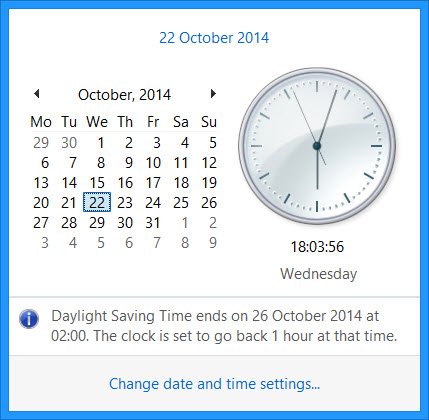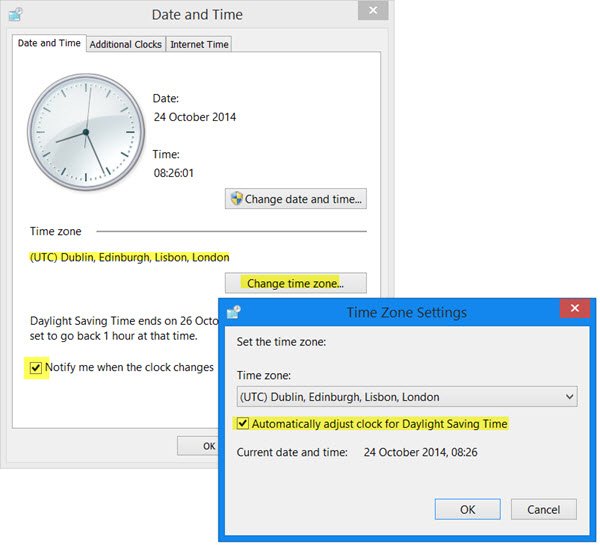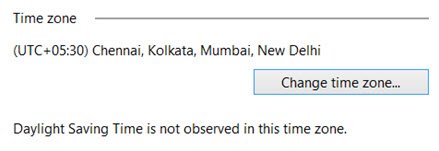At some point during the year, some of you may see a notification when you click on the Taskbar clock in Windows. The notification could be something to this effect:
Daylight Saving Time ends on (date) at (time). The clock is set to back/forward 1 hour at that time.

Let us see what Daylight Saving Time is, what this notification means, and how to change Daylight Saving Time on a Windows system.
What is Daylight Saving Time or DST
For those of you who do not know what is Daylight saving time DST, let me explain in brief.
In most of Europe, local time is moved forward by 1 hour in Spring and moved backward by 1 hour in Autumn. This happens around March or April and ends in October or November. This practice is called Daylight Saving Time. These shifts are different in the North and South hemispheres and may vary from country to country. In the southern hemisphere, the changes are the opposite.
Automatically adjust clock for Daylight Saving Time in Windows 11/10
Microsoft Windows has established an annual update schedule for Daylight Saving Time (DST) and Time Zone (TZ) releases. From time to time it releases DST Cumulative Updates and Updates for Time Zone changes. If you have Windows Update set to ‘automatically install’, there is nothing you need to do, as this will give you a seamless transition to the new Daylight Savings Time and Time Zone settings.
Every country has its own DST implementation policy. Some may not observe DST, while others may change the start dates and end dates for DST every year.
Windows stores time zone information in two locations in the registry.
HKEY_LOCAL_MACHINE\SOFTWARE\Microsoft\Windows NT\CurrentVersion\Time Zones HKEY_LOCAL_MACHINE\SYSTEM\CurrentControlSet\Control\TimeZoneInformation
It is recommended that you use Microsoft Update or download the time zone update from the Microsoft download site instead of manually editing the registry. But if you wish to change the time zone settings manually, you can use the Time Zone Editor or Tzedit.exe tool.
This tool lets you create and edit time zone entries for the date and time settings in the Control Panel. You can read more about this at KB914387.
Depending on your Time Zone, if you have checked the Notify me when the clock changes box, you will see this notification in your Windows Clock in the taskbar. By default, the Automatically adjust clock for Daylight Saving Time option is checked.

If your time zone does not observe DST, then you will see Daylight Saving Time is not observed in this time zone display.

You can access this Date and Time applet via your Control Panel.
This post will help you if Adjust for daylight saving time automatically is grayed out.
Read: Daylight Saving Time setting causes high CPU & memory usage
Disable Automatic Daylight Savings Adjustment
If you wish to disable Automatic Daylight Savings Adjustment for some reason, you can uncheck the checkbox as shown in the above image. Or you may edit the registry as follows:
Open the Windows Registry Editor and navigate to the following key:
HKEY_LOCAL_MACHINE\SYSTEM\CurrentControlSet\Control\TimeZoneInformation
Here in the right-side pane, create a new DWORD Value. Name it DisableAutoDaylightTimeSet and give it a value of 1. To enable it back, change its value to 0 or simply delete this key.
This post will help you if Windows does not update Daylight Savings Time (DST) change.
TIP: See how you can change Time Zone with tzutil.exe in Windows.
Leave a Reply